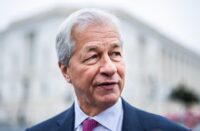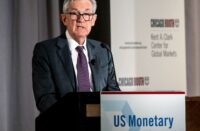Title: Unrest in South Korea: Impact on the Nation’s Economy and Stock Market
On December 3, 2024, the capital city of Seoul, South Korea witnessed an unexpected political uproar when President Yoon Suk Yeol announced an emergency martial law. Yoon proclaimed that the imposition of martial law was essential to safeguard the nation from “communist forces” amidst the ongoing legislative dispute over a budget bill, an event that had police securing the premises of the National Assembly.
The news of the martial law decree and its subsequent retraction after being overturned by the National Assembly led to significant fluctuations in South Korean stock performance in the U.S. market. This brought about concerns regarding the stability of the world’s 13th largest economy.
The iShares MSCI South Korea ETF (EWY), an exchange-traded fund that monitors over 90 prominent companies in South Korea, saw a dramatic 7% drop, hitting a one-year low. However, later in the day, the ETF managed to trim its losses, ending the day 1.6% down following President Yoon’s decision to retract the emergency declaration.
Despite this, the ETF is heading towards its fifth consecutive day of losses, marked by an unusually high trading volume. Over 35 million shares were traded on Tuesday alone, over ten times its average volume over the past 30 days.
The U.S.-listed shares of Korean companies also saw a dip. Korea Electric Power’s ADRs fell over 2%, and the Korean e-commerce powerhouse, Coupang, saw a 3.7% drop. The shares of KT Corp., previously known as Korea Telecom, fell slightly less than 1%, while Posco, a South Korean steel production giant, saw a drop of over 4%.
In a swift response to President Yoon’s imposition of martial law, 190 of the 300 National Assembly lawmakers convened to overthrow the emergency order within just three hours.
President Yoon accused opposition parties of favoring North Korea and manipulating the parliament. However, he failed to elaborate on how the temporary rule by military authorities during an emergency would impact the country’s governance and democratic values.
Under the martial law decree, all political activities and actions that “stir up social unrest” were banned. This marked the first time a South Korean leader has declared martial law since 1980.
Despite the turmoil, the Korea Exchange assured the public that the stock market would open as usual at 9 a.m. KST the following Wednesday. On the other hand, the U.S. dollar gained around 0.9% against the South Korean won on Tuesday.




